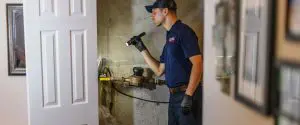

An important part of owning a business is pest control. Establishments of all kinds are susceptible to infestations and unfortunately, pests have figured out more than one way to devastate a business, from safety hazards to costly damage to ruined reputations. Avoid pests and all of the bad that comes with them with the following answers to some of the most frequently asked questions in commercial pest control.
What kinds of businesses need pest control?
As a general rule, all businesses should have some form of pest control in place, especially if the business itself is visited by members of the public. If even a single pest is spotted by a customer, your hard-earned reputation could be ruined. More importantly though, pests jeopardize the health and safety of both your staff and your clientele, therefore pest control for retail stores and office pest control should be a priority for business owners.
Most pests carry and spread a number of bacteria and diseases. In addition, many pests can cause allergic and asthmatic reactions. Pest damage can lead to fire hazards and other safety hazards- for instance, termites can compromise the structural integrity of an entire building. Pests contaminate any food or food prep surfaces and items that they come into contact with. Any tainted food items cannot be consumed and must be thrown away no matter the cost to your business.

Remote businesses like online stores do not have to worry as much about their customers coming into contact with pests. It is still possible, though- many pests like to hitchhike in packing materials. Sending a package with pests to a customer may introduce an infestation into their home, or into other packages it meets along the way. Moreover, pests destroy non-food items like paper products, fabrics, furniture, wooden items, and more. An infestation could ruin any business’s entire stock of products or materials. Overall, it is much more costly to your business to have an infestation than to prevent one.
Why should pest control be a priority for property managers?
As a business owner, you’re always looking to put your best foot forward. For property managers, that means providing your tenants with a safe, clean, and pest-free rental space. It is a property manager’s responsibility to prevent pests and promptly take care of any pest issues that may arise. Property management pest control is particularly important in high-population properties like apartment buildings and multi-family homes. Densely populated areas are very attractive to pests, making such areas more susceptible to infestations. Regular pest control treatments will keep out even the most determined of pests, so you can rest easy knowing your tenants are enjoying their pest-free rental space.
How often should properties receive pest control?
Every property is different and will require a unique pest control schedule, but in general, businesses should receive monthly or quarterly preventative treatments. After all, the best method of pest control is prevention; if pests never move in, an infestation can never occur. If any pest problems do arise, additional treatments are necessary until the issue is resolved. At Excel, all of our services are 100% guaranteed, which means any extra treatments are free-of-charge.

How to deal with pest problems on your property
Here are some general tips to help make your property less attractive to all types of pests:
- Seal all holes that lead into the building including cracks in the foundation or walls, gaps around windows and doors, damaged shingles, and gaps around utility wires.
- Trim back trees and shrubs so they don’t grow too close to the building. Many pests will use branches and foliage as pathways to reach a home.
- Remove all debris piles or keep them as far away from the property as possible. Pests love a good hiding spot, and many will look for piles of tree trimmings, leaves, grass cuttings, or weeds from the garden.
- Fix any leaks and clogs promptly. Excess moisture in dark, low-traffic areas is a recipe for an infestation.
- Fix or replace old and decaying wood. Carpenter ants and some termites are always searching for old wood to tunnel through or eat, and they will wreak havoc on structures built with any amount of damp wood.
- Speak to your staff or renters about practicing pest prevention. This means keeping food in sealed containers, promptly cleaning up food residue, not leaving pet food out, properly disposing of food waste, minimizing clutter, and keeping stored items (documents, photo albums, etc.) in sealed plastic containers rather than cardboard boxes. Ask your staff or renters to report any signs of pests right away.
Still have some questions about pest control for your business? Find answers specific to your business type on our Commercial Services page, or give us a call. We’ll work with you to build a pest control service plan that suits your business’s needs.






